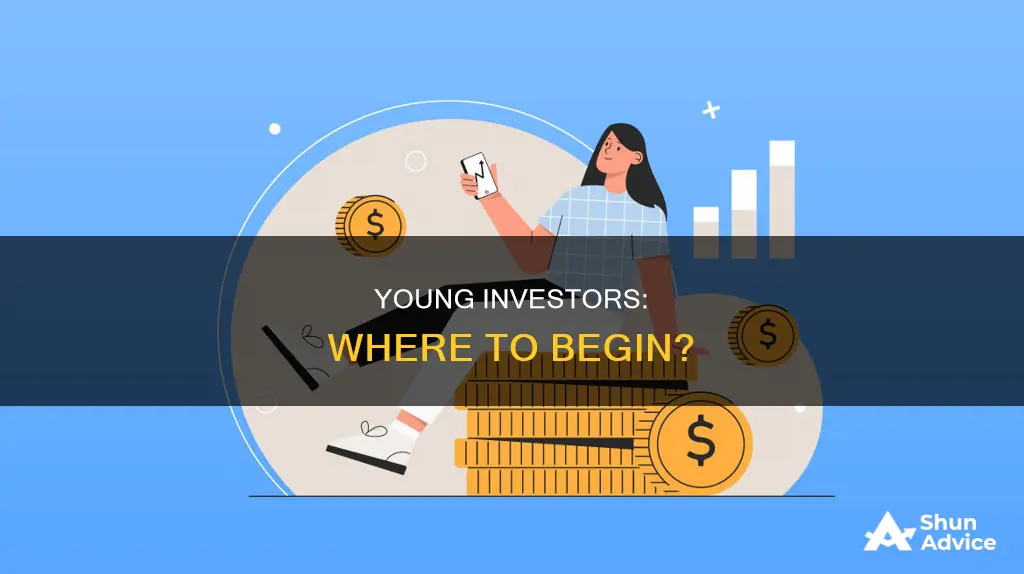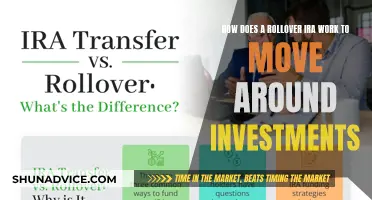
Young people have the most valuable resource on their side when it comes to investing: time. The earlier you start investing, the more time your portfolio has to grow. This is due to the power of compound interest, which is interest earned on the interest accrued. The longer you leave your investments, the more interest you will earn.
For example, if you invest $5,000 a year from the age of 25 to 35, and then stop investing, you will have accumulated $602,070 by the time you retire. However, if you don't start saving until you are 35 and then save $5,000 a year from the age of 35 to 65, you will only have $540,741 by retirement.
Young investors can also take advantage of their age by seeking out bigger returns through taking bigger risks. This is because if a young investor loses money, they have time to recover the losses through income generation. However, it is important to note that this is not an argument for gambling or taking highly speculative trades. Instead, young investors should focus on solid companies with long-term upside potential.
While investing in your twenties may sound boring, starting young is the best way to get ahead.
| Characteristics | Values |
|---|---|
| Time | Young people have time on their side. The earlier you start investing, the more time your portfolio has to grow. |
| Compound Interest | Compound interest is a powerful force when it comes to building wealth. |
| Experience | Investing early allows you to learn from your mistakes and gain experience. |
| Retirement | Young investors should consider starting a retirement fund. |
| Education | Investing in your education can open doors to higher-paying jobs. |
| Property | Buying a home is a significant investment and should not be taken lightly. |
| Index Funds | Index funds are an easy way to build a portfolio quickly with expert assistance and lower fees. |
| Debt | Eliminating debt will put you in a better position to save more in the future. |
| Short-Term Investments | Short-term investments such as money market funds and certificates of deposit can be a great way to put your money to work while maintaining liquidity. |
What You'll Learn

Retirement funds
Young people have the most valuable resource on their side when it comes to investing: time. The power of compound interest means that even small investments can grow into large sums over time. For example, if you invest $5,000 a year from age 25 to 35 and stop contributing altogether, you will still have $602,070 by the time you retire. This is because compound interest is interest earned on the interest that you’ve previously accrued.
The earlier you start investing, the more time your portfolio has to grow. Time is the secret ingredient in compounding. The more time you have to invest, the wealthier you will be.
- 401(k)s: These are extremely good investment choices, especially if your employer will match your contributions. A 50% match on the first 5% of your contributions can result in tens of thousands of extra dollars in your pocket at retirement.
- IRAs: Most financial experts tell young people to use a Roth IRA instead of a traditional IRA because their contributions and everything they earn will grow tax-free until retirement. You won't pay any tax on withdrawals, although you don't get a tax benefit from your contributions.
- SIMPLE IRAs: These are also extremely good investment choices if your employer will match your contributions.
- Real Estate: This can be a solid investment choice if you plan to stay in the same place for longer than five years. Real estate prices don't grow as quickly as stock prices but real estate also has fewer booms and busts.
- Stocks: Consider putting as much of your savings as possible in some form of equities, such as common stocks and stock mutual funds. Stocks tend to gain value faster than the rate of inflation.
Why Invest in Farms?
You may want to see also

Property
Investing in property is a great way to build wealth, and the younger you start, the more time you have to build your portfolio and generate long-term wealth. However, young people often face barriers to entry, such as lack of financial resources and experience. Here are some tips for young people interested in investing in property:
Education and Research
Before investing in property, it is important to educate yourself and conduct thorough research. Understand the different strategies, such as buying and holding, house hacking, house flipping, and renting out property. Learn about the process of development and home buying, as well as the financial aspects of investing.
Build a Network
Networking is crucial in the real estate industry. Connect with other investors, real estate agents, contractors, and professionals who can provide guidance and support. Consider joining networking groups, mentorship programs, or seeking a veteran mentor. Building a strong network can help you navigate the challenges of investing and provide valuable insights and opportunities.
Start with a Plan
Develop a business plan tailored to your goals and strategies. Define your investment objectives, risk tolerance, and time horizon. Understand your financial situation and seek ways to increase your income and savings. This may include picking up a side hustle or cranking up your savings rate.
Explore Different Options
There are various ways to invest in property beyond traditional property ownership. Consider real estate investment trusts (REITs), which are companies that own and operate income-producing real estate. You can invest in REITs through the stock market or online platforms with relatively low capital. Another option is real estate crowdfunding, where you can invest in larger group properties with smaller amounts of money.
Understand the Risks and Costs
Investing in property carries risks and costs. Be prepared for unexpected maintenance, repairs, and vacancies. Understand the financial commitment required, including the down payment, closing costs, and potential mortgage payments. Ensure you have sufficient funds or explore partnership options if needed.
Fear of Investing: Why the Hesitation?
You may want to see also

Index funds
Benefits of index funds
- Lower costs and fees: Index funds tend to have lower expense ratios than actively managed funds, which can result in higher returns for investors.
- Reduced risk through diversification: Index funds provide immediate diversification by investing in a large number of stocks or bonds across different industries. This diversification can help reduce the risk of losing money.
- Reduced human bias and error: Index funds are less susceptible to human biases and mistakes that can occur during stressful market conditions because they simply aim to replicate the performance of a specific index.
- Reduced investment taxes: Index funds tend to sell less often than actively managed funds, which can result in lower taxes for investors.
Drawbacks of index funds
- Average market returns: Index funds tend to deliver average market returns because they include both high- and low-performing stocks and bonds. Actively managed funds, on the other hand, may be able to deliver higher returns by picking only the best-performing stocks.
- Costs to manage the index fund: While index funds tend to have lower costs, they are not always no-cost. Some funds have investment minimums, and all funds charge an expense ratio to pay the fund manager.
- Possible tracking errors: Fund managers aim to track the performance of a specific index, but sometimes there is a misalignment between the fund's performance and the index it is tracking, known as a tracking error.
- No downside protection: Index funds do not provide downside protection, so they can lose money during market downturns.
- No control over investment holdings: Investors do not have control over the specific investments included in an index fund, which may be frustrating for those who want to remove investments they don't like.
How to invest in index funds
- Choose an investment platform or online brokerage.
- Open and fund an account by providing personal information and depositing funds.
- Select an index fund by researching the fund's performance history, management fees, and the index it tracks. Consider diversifying your portfolio by investing in multiple index funds.
- Buy shares of the chosen fund through the investment platform or brokerage.
- Monitor and adjust your portfolio periodically to ensure it aligns with your financial goals.
However, it's important to consider the drawbacks of index funds as well. Young investors may want the potential for higher returns offered by actively managed funds or the flexibility to choose specific investments. Ultimately, the best investment strategy will depend on an individual's financial goals, risk tolerance, and investment horizon.
Investments: Where People Put Their Money
You may want to see also

Education
Higher Earning Potential
Investing in education is one of the best ways to attain better and higher salaries. A degree in any subject translates into having deeper knowledge and expertise in a desired field compared to someone who doesn't have one. By going to college, students can develop their skills by taking up internships, workshops, and seminars, and building their credibility for future job roles.
Networking Opportunities
Unbreakable Work Ethics
The early traces of work ethics often come from school and college days. Whether writing a difficult essay, adhering to assignment deadlines, or giving a presentation, students display traits of work ethics like communication, punctuality, organisational skills, and productivity. These soft skills are essential for reaching the peak of one's career.
Personal Development
Better Career Prospects
Investing in education can pave the way for career transitions and upskilling. For instance, many professionals opt for MBA programs to improve their career prospects and transition into higher responsibility roles.
Long-Term Currency
Other Benefits
While investing in education has numerous advantages, it is essential to consider the potential risks, such as uncertain returns, a changing job market, and the quality of educational programs.
Mutual of America: Worth the Investment?
You may want to see also

Short-term investments
Young investors have the most valuable resource on their side: time. Even if you have little disposable income and encounter unexpected expenses, putting your savings in the bank isn't ideal as these accounts don't accumulate significant interest.
High-yield savings accounts and money market accounts
High-yield savings accounts and money market accounts are currently offering annual percentage yields of between 4% and 5%, which is significantly better than the 0.45% national average interest rate on savings accounts. Both savings and money market accounts are FDIC-insured, meaning your money is protected up to $250,000 per institution, per depositor, in case of a bank failure.
Cash management accounts
These accounts are typically offered by robo-advisors and online investment firms (or discount brokers). They provide a liquid cash account that allows you to access your money quickly and may pay interest on your holdings. Cash management accounts are often invested in safe, low-yield money market funds, so there's not a lot of risk.
Short-term bond funds
A bond is a loan to a company or government that pays back a fixed rate of return. A short-term corporate bond fund is not insured by the government, so it can lose money. However, bonds tend to be quite safe, especially if you're buying a broadly diversified collection of them. In addition, a short-term bond fund provides the least amount of risk exposure to changing interest rates, so rising or falling rates won't affect the price of the fund too much.
No-penalty certificates of deposit (CDs)
A no-penalty CD lets you dodge the typical fee that a bank charges if you cancel your CD before it matures. CDs are insured by the FDIC, so you won't lose any money on them. The lack of a penalty helps mitigate the risk of missing out on a better rate elsewhere while your money is tied up in the CD.
US Treasury bills
Treasury bills come in three varieties – T-bills, T-bonds and T-notes – and they offer the ultimate in safe yield, backed by the AAA credit rating of the US federal government. But it's the T-bills that are the short-termers, with a maturity of up to a year.
Exchange-traded funds (ETFs)
ETFs are similar to index funds that track a specific market index like the S&P 500. They are typically cheaper to purchase and manage than mutual funds; some brokerage firms offer them at $0 commission.
Investing: A New National Pastime?
You may want to see also
Frequently asked questions
Some good short-term investment options include online checking and savings accounts, money market accounts, certificates of deposit (CDs), and short-term bond funds.
Investing early allows you to take advantage of compound interest, which is the interest earned on the interest that you've previously accrued. The earlier you start investing, the more time your portfolio has to grow.
Some common mistakes that young investors make include speculating instead of investing, using too much leverage, and not asking enough questions. It's important to do your research and understand the risks involved before making any investment decisions.
As a young investor, you may want to start with a small percentage of your income and gradually increase the amount you invest as you get older and earn more. This will allow you to save for retirement while also saving for other short-term goals.
Besides investing in the stock market, you can invest in yourself by investing in your personal, professional, and financial growth. This could include reading books, attending conferences, or pursuing additional education or certifications to advance your career.







